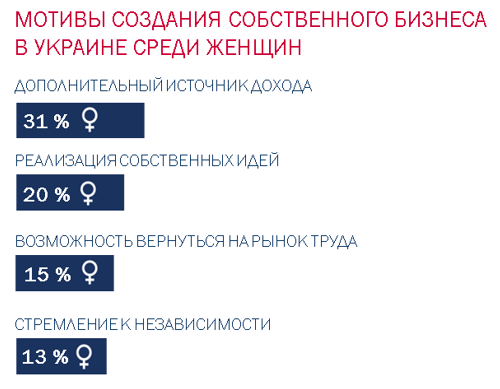
Ukrainian women, like other women in Europe, lack confidence in their abilities to create their own business. Only 34% of women in Europe and 24 percent in Ukraine consider themselves ready to conduct business, while the global average among women – 41%.
Such indicators resulting Amway Global study on entrepreneurship.
According to the study, those wishing to engage in entrepreneurship among European women and Ukrainian women is also less than the world average (52%) – 43% and 32%, respectively.
While women in Europe believe that after 5 years of entrepreneurship, in terms of patterns of employment will play a growing role, and most of the Ukrainians was not able to decide what will happen to the business in the future.
The index of business sentiment (Amway Entrepreneurial Spirit Index, AESI) is an integrated indicator, which was introduced in 2015 and is calculated as the combined score for the three parameters influencing the intention is to start a business, namely: the desire to run your business, the willingness to engage in business terms desired knowledge and skills and resistance to social pressure.
It was found that among respondents from Europe, the index value is lower (41 points) than among women globally (47). Ukrainian women showed even lower score with only 29 points.
Three components of integrated index AESI allow you to understand the reasons for this discrepancy. For women in Europe and in Ukraine in particular, the ability to start a business is less attractive (43% and 32% respectively would like to do business) than for women worldwide (52%).
In addition, only 34% and 24% Ukrainian and European respondents respectively believe that they have sufficient knowledge and experience to start their own business, compared with 41% on average globally.
In particular, the main difficulty, according to respondents, is the need to find and attract customers: only 47% of women in Europe and 31% of Ukrainians feel comfortable.
Despite the fact that the desire to start a business among European women is much less than the world average, the respondents from Europe and around the world showed similar levels of resistance to social pressure: 45% and 47% respectively ready at the opening of business not to succumb to pressure and negative opinion of friends or relatives.

At the same time Ukraine in the same figure is much behind – only 31% of women will continue to move towards entrepreneurship, even in the absence of support from his family.
Vision for the future of entrepreneurship is ambiguous
In the study, the question of the role of entrepreneurship and self-employment as the employment model of the future showed some interesting results. 35% of women in Europe believe that self-employment will play a more important role over the next five years, with the optimism of Ukrainian women milder: this opinion is shared by only 22% of the respondents. Another 31% of the inhabitants of Europe and 28% of Ukrainians believe that the role of entrepreneurship will remain at the current level, and only 23% and 13% of the respondents from Europe and Ukraine, respectively, think it will drop.
It is worth to note that a significant portion of the respondents Ukrainians were unable to determine the answer – they are already 37%, in contrast to women in Europe, where, among undecided voters, only 11%.
“AGER demonstrates the fundamental contradiction in society: on the one hand, this optimistic vision of the future of entrepreneurship, and with another – the lack of ambition and skills necessary to succeed in business”, says Michael Meissner, Director of corporate Affairs at Amway Europe.
According to him, every European country, international and local business organizations and NGOs should ensure that all, regardless of gender, age and any other socio-demographic characteristics, the ability to work in conditions that are comfortable for them.
“Entrepreneurship is a means to impart necessary business skills to create an environment in which entrepreneurs can develop, make mistakes, learn and improve your business. The results of our study show that current efforts are insufficient” – summed up Michael Meisner.







